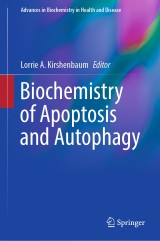Details

Biochemistry of Apoptosis and Autophagy
Advances in Biochemistry in Health and Disease, Band 18
|
171,19 € |
|
| Verlag: | Springer |
| Format: | |
| Veröffentl.: | 29.11.2021 |
| ISBN/EAN: | 9783030787998 |
| Sprache: | englisch |
| Anzahl Seiten: | 283 |
Dieses eBook enthält ein Wasserzeichen.
Beschreibungen
<div>One of the most intriguing and compelling issues to impact contemporary biology to date is the concept that cell death is genetically regulated. Observations by Kerr and Wyllie, made more than 30 years ago on the basis of distinct morphological criteria, markedly distinguished apoptosis from classical cell death by necrosis. Apoptosis is a highly regulated, evolutionary conserved, genetic program of cell death essential for normal development and tissue homeostasis. The discovery of apoptosis as a regulated event and potentially amenable to therapeutic interventions has generated considerable excitement because it meant that disease entities resulting from either too much, or too little, apoptosis could be potentially cured with new therapies that target apoptosis.</div><div><br></div><div>While there is little doubt that necrosis induced by massive cellular trauma is likely an unregulated event, several lines of investigation have challenged the dogma that necrotic cell death ismerely unregulated. Emerging data has shifted the paradigm in our thinking about necrosis as a regulated event.</div><div><br></div><div>Autophagy is another cellular process that has received considerable attention over the past two decades and its remarkable involvement in the processes of cell survival, death and tumorigenesis. Macro autophagy is a catabolic process that involves the selective and targeted removal of oxidized proteins, macromolecular structures and organelles through an elaborate cellular process involving a lysosome mediated pathway. Other forms of autophagy involving adapter proteins, commonly referred to as chaperone mediated autophagy, involves the selective removal of cellular cargo by the ubiquitin-proteasome pathway.</div><div><br></div><div>The book will serve as a reference guide for basic and clinical scientists who are interested in understanding how these critical cellular processes impact the pathogenesis of human disease.</div>
A Protein-centric Perspective of Autophagy and Apoptosis Signaling and Crosstalk in Health and Disease.- Adrenergic receptor signaling pathways in the regulation of apoptosis.- Apoptosis in Ischemic Heart Disease.- Autophagy in cardiac physiology and pathology.- Caspase signaling pathways as convenors of stress adaptation.- Cross talk between apoptosis and autophagy in regulating the progression of heart disease.- Fibroblasts, Fibrosis and Autophagy.- Gene Therapy and Its Application In Cardiac Diseases.- Inflammation and mitochondrial degradation in the heart.- Mitochondria and Cellular Hosts_An Uneasy Truce.- Mitochondrial Dysfunction and Mitophagy.- Proteotoxicity and Autophagy in Neurodegenerative and Cardiovascular Diseases.- Regulation of Cell Death Signaling Pathways in Cardiac Myocytes by Mitochondrial Bnip3 – Inna.- Role of Cardiomyocyte Apoptosis in Heart Failure.- The Role of FGF2 Isoforms In Cell Survival In The Heart.
<div><div>One of the most intriguing and compelling issues to impact contemporary biology to date is the concept that cell death is genetically regulated. Observations by Kerr and Wyllie, made more than 30 years ago on the basis of distinct morphological criteria, markedly distinguished apoptosis from classical cell death by necrosis. Apoptosis is a highly regulated, evolutionary conserved, genetic program of cell death essential for normal development and tissue homeostasis. The discovery of apoptosis as a regulated event and potentially amenable to therapeutic interventions has generated considerable excitement because it meant that disease entities resulting from either too much, or too little, apoptosis could be potentially cured with new therapies that target apoptosis.</div><div><br></div><div>While there is little doubt that necrosis induced by massive cellular trauma is likely an unregulated event, several lines of investigation have challenged the dogma that necrotic cell death is merely unregulated. Emerging data has shifted the paradigm in our thinking about necrosis as a regulated event.</div><div><br></div><div>Autophagy is another cellular process that has received considerable attention over the past two decades and its remarkable involvement in the processes of cell survival, death and tumorigenesis. Macro autophagy is a catabolic process that involves the selective and targeted removal of oxidized proteins, macromolecular structures and organelles through an elaborate cellular process involving a lysosome mediated pathway. Other forms of autophagy involving adapter proteins, commonly referred to as chaperone mediated autophagy, involves the selective removal of cellular cargo by the ubiquitin-proteasome pathway.</div><div><br></div><div>The book will serve as a reference guide for basic and clinical scientists who are interested in understanding how these critical cellular processes impact the pathogenesis of human disease.</div></div>
Covers all aspects of apoptosis Chapters submitted from world renowned researchers Unique in defining the relationship between the regulatory mechanisms
Diese Produkte könnten Sie auch interessieren:

Tropical and Parasitic Infections in the Intensive Care Unit

von: Charles Feldman, George A. Sarosi

149,79 €















